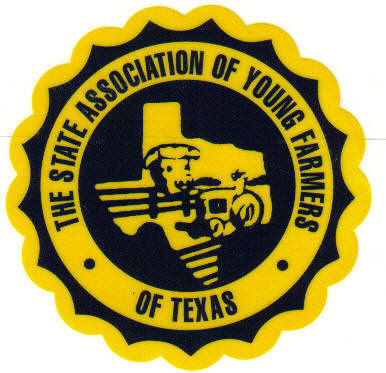 As far back as the early 1940's, clubs were organized under sponsorship of local vocational agriculture teachers that proved to be the forerunner of the Young Farmer program as we know it today. The clubs were made up of former FFA members who held high degrees in the organization. When clubs were organized, they usually took the name of "Gold Key Club", or "FFA Alumni Club". The organization of the State Association of Young Farmers of Texas took place at the Texas FFA Convention in 1950. A group of prominent former FFA members organized, elected officers, and adopted the name “Texas FFA Alumni Association.” Soon thereafter, the Korean Conflict started and so many Young Farmers were drafted that the organization became inactive.
As far back as the early 1940's, clubs were organized under sponsorship of local vocational agriculture teachers that proved to be the forerunner of the Young Farmer program as we know it today. The clubs were made up of former FFA members who held high degrees in the organization. When clubs were organized, they usually took the name of "Gold Key Club", or "FFA Alumni Club". The organization of the State Association of Young Farmers of Texas took place at the Texas FFA Convention in 1950. A group of prominent former FFA members organized, elected officers, and adopted the name “Texas FFA Alumni Association.” Soon thereafter, the Korean Conflict started and so many Young Farmers were drafted that the organization became inactive.
The State Association sprang to life again at the 1953 State FFA Convention in Fort Worth. Officers were elected and work was begun on a new constitution that was adopted at the 1954 State Convention. This time the group took the name of THE STATE ASSOCIATION OF YOUNG FARMERS OF TEXAS. Membership was no longer restricted to former FFA members, and the maximum age limit for active membership was set at 35 years old. Young Farmer conventions have been held annually since 1954. For the first time, in 1961, the Young Farmer convention was held separately from the FFA and at a date more convenient for Young Farmers. The convention was a great success. Support of agribusiness firms, manifested through purchase of other means, was tremendous and proved to be a source of encouragement to the Young Farmers.
Since the Association’s beginning, major emphases in local Young Farmer programs have been placed on education. In addition, each chapter’s program includes cooperative and community service activities, leadership development, and recreation. Many worthwhile civic and community service projects have been carried out each year by local chapters.
During the 1954 - 59 periods, Young Farmer activities were directed by Dr. J.R. Jackson, of the Agricultural Education Department of Texas A&M. In 1959, the program’s administration was transferred to the division of Agricultural Education at the Texas Education Agency. Mr. E.L. Tiner of the Texas Education Agency was appointed the first Executive Secretary.
With an increase in chapters statewide, the need for area organizations arose. Between 1960 and 1964, each of the 10 vocational agriculture supervisory areas organized an area Young Farmer Association, and developed programs of work. An indicator of the success of Area Young Farmer program is the fact that over 3000 Young Farmers and Young Homemakers participated in area conventions and awards banquets in 1966.
By the end of 1966, membership exceeded 4600 people in some 216 chapters. Since the public is often invited to local educational programs, Young Farmers have brought educational benefits to a group far larger than the number of active members.
Young Farmers have made liberal use of resource personnel in continuing educational activities. Agribusiness firms have been generous in providing programs and awards locally and statewide. Many people in different walks of life have made important contributions to the success of the Young Farmer program and rightfully share the credit for overall success.
The future of agriculture lies with the youth of America, and the ability to become more involved in the education of our young people. What better way to keep an organization and country moving forward than to educate the young men and women of today…for tomorrow
From the beginning, major emphasis in local Young Farmer programs has been placed on education. Most educational programs are geared to keeping Young Farmers abreast of new developments in the field of agriculture, agribusiness, and leadership training.
There are ten Area Young Farmer associations functioning, and agricultural science teachers are working with Young Farmer chapters organized on a local school district or county basis. Resource personnel from business and industry and from various professional agricultural workers organizations are making a great contribution to the success of local programs providing education programs on timely agricultural topics.